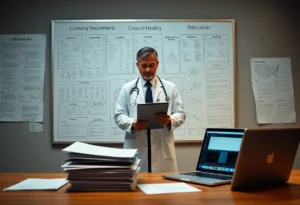As you consider relocating your medical practice to a new state, you face a complex process. Your medical license and credentials must be in order to practice in your new location. You will need to navigate the specific requirements of your new state, which can be time-consuming and overwhelming. Understanding the credentialing and licensing process is imperative to a smooth transition, allowing you to focus on your patients and your practice, rather than administrative hurdles.

Credentialing Requirements
Your credentialing requirements will vary depending on the state and medical institution you are relocating to. It’s imperative to research and understand the specific requirements for your new location.
Overview of Credentialing Process
Beside the licensing process, credentialing is a separate step that verifies your education, training, and experience. You will need to provide documentation and meet specific standards to be credentialed.
Types of Credentials Needed
Next to your medical license, you will need other credentials, such as:
- Board certification
- Malpractice insurance
- DEA registration
You will need to gather these credentials to apply for hospital privileges. Recognizing the importance of credentialing, you should start the process early.Credential Description Medical License State-issued license to practice medicine Board Certification Specialty-specific certification Malpractice Insurance Liability insurance for medical practice DEA Registration Registration for prescribing controlled substances Hospital Privileges Approval to practice at a specific hospital By understanding the types of credentials needed, you can ensure a smooth transition to your new location. You will need to:
- Verify your credentials with the state medical board
- Obtain malpractice insurance
- Apply for hospital privileges
Recognizing the complexity of the credentialing process, you should seek guidance from your new employer or a credentialing expert.At this stage, you should have a clear understanding of the credentialing requirements for your new location. You will need to:
- Gather required documents
- Submit applications for credentials
- Follow up on the status of your applications
Recognizing the importance of timely credentialing, you should start the process well in advance of your relocation.Licensing Requirements
There’s a lot to consider when it comes to licensing requirements as a physician. You need to understand the various regulations and standards that govern your practice, and ensure you meet all the necessary criteria to practice medicine in your new location.
State Licensing Requirements
The state where you plan to practice medicine has its own set of licensing requirements, which you must comply with. You will need to research and understand the specific requirements for your state, including any exams, certifications, or continuing education requirements that apply to you.
Federal Licensing Requirements
Before you start practicing medicine, you need to ensure you meet the federal licensing requirements. You will need to obtain a DEA license, which allows you to prescribe controlled substances, and comply with other federal regulations that govern your practice.
Requirements for federal licensing can be complex, so you will need to carefully review the regulations and ensure you are in compliance. You may need to complete additional training or certifications, and maintain accurate records to demonstrate your adherence to federal standards. As you navigate the licensing process, you can consult with professional organizations or seek guidance from a licensing expert to ensure you meet all the necessary requirements to practice medicine in your new location.
Relocation Considerations
The process of relocating as a physician involves several factors, including credentialing and licensing requirements. You will need to consider these elements when deciding where to move and practice medicine.
Researching New Locations
One of the first steps in relocating is researching new locations, which will help you determine the best place for your career and personal goals. You should consider factors such as cost of living, job opportunities, and quality of life.
Evaluating Job Opportunities
The job opportunities available in your desired location will play a significant role in your decision to relocate. You should evaluate the types of positions available, as well as the work environment and compensation packages.
Considering the specifics of each job opportunity, you will want to think about how your skills and experience align with the requirements of the position, and whether the job will provide you with the challenges and rewards you are looking for in your career as a physician. You should also think about your long-term goals and how this new opportunity will help you achieve them.
Application Process
After initiating the relocation process, you will need to navigate the application process for credentialing and licensing. This involves several steps, including gathering necessary documents, submitting applications, and waiting for approval. You should stay organized and ensure all requirements are met to avoid delays.
Gathering Necessary Documents
Above all, you must collect all required documents, including your medical degree, transcripts, and certification records. You will need to verify your education, training, and experience to meet the licensing requirements of your new state.
Submitting Applications
On completing your document gathering, you will submit your applications to the relevant authorities. You should double-check that all information is accurate and complete to ensure a smooth process.
Submitting your applications is a significant step in the relocation process. You will need to pay the required fees and wait for the authorities to review your applications. You can check the status of your applications online or contact the relevant authorities for updates, and once approved, you will receive your license and can begin practicing in your new state.
Timeframe and Costs
Not all states have the same requirements, so your relocation process may vary. You should research your new state’s specific rules and regulations to ensure a smooth transition.
Timeline for Credentialing and Licensing
Certification procedures can be lengthy, taking several months to a year or more to complete. You will need to plan ahead to avoid gaps in your practice.
Associated Fees and Expenses
About the expenses, you should expect to pay for licensing, credentialing, and other services. Your costs will depend on the state and type of license you need.
To minimize your expenses, you can start by gathering all the necessary documents and information in advance. You can also contact your state’s medical board to get a detailed estimate of the fees involved, helping you budget and plan your relocation more effectively, ensuring your transition as a physician is as seamless as possible, allowing you to focus on your practice and your patients.
Maintaining Credentials
Many physicians underestimate the effort required to maintain their credentials, but you will need to stay on top of various requirements to continue practicing medicine in your new location.
Renewal Requirements
To keep your credentials up to date, you will need to fulfill specific renewal requirements, which vary by state and specialty, so you should check with your state medical board for details on the process.
Continuing Education
Along with renewal requirements, you will also need to complete continuing education courses to stay current with the latest medical advancements and best practices, which will help you provide the best possible care for your patients.
Continuing your education is an ongoing process that requires you to stay committed to learning and professional development, and you can achieve this by attending conferences, workshops, and online courses, which will not only help you maintain your credentials but also enhance your skills and knowledge as a physician, allowing you to provide high-quality care and stay competitive in your field.
Conclusion
Upon reflecting on the process of relocating as a physician, you will find that understanding credentialing and licensing requirements is crucial to your success. You must navigate complex regulations and ensure your qualifications meet the standards of your new location. By doing so, you will be able to practice medicine with confidence, knowing you have fulfilled all necessary obligations, and your patients will benefit from your expertise, allowing you to establish a thriving medical practice in your new location. Your diligence will pay off, enabling you to provide quality care.
FAQ
Q: What are the general steps I need to take to relocate as a physician and obtain the necessary credentialing and licensing requirements?
A: When relocating as a physician, it is vital to start by researching the specific requirements of the state and institution you are moving to. This includes understanding the licensing requirements, which typically involve submitting an application, paying fees, and providing documentation such as medical school transcripts, residency completion certificates, and board certification. Additionally, you will need to obtain credentialing from the relevant medical boards and institutions, which may involve undergoing a background check, providing professional references, and meeting specific training and experience requirements. It is also important to ensure that your medical malpractice insurance is transferable or obtain new coverage in your new location.
Q: How do I navigate the complex process of obtaining medical licensure in a new state, and what are the different types of licenses available to physicians?
A: Obtaining medical licensure in a new state can be a complex and time-consuming process, but it can be simplified by understanding the different types of licenses available. These include full and unrestricted licenses, limited or restricted licenses, and temporary or provisional licenses. Full and unrestricted licenses allow physicians to practice medicine without any restrictions, while limited or restricted licenses may have specific requirements or limitations. Temporary or provisional licenses are typically issued for a limited period and may be used for physicians who are waiting for their full license to be processed. It is also important to note that some states have reciprocity agreements, which allow physicians licensed in one state to practice in another state without obtaining a new license.
Q: What role do credentialing organizations, such as the Joint Commission and the National Committee for Quality Assurance, play in the process of relocating as a physician, and how can I ensure that my credentials are up-to-date and meet the requirements of my new institution?
A: Credentialing organizations, such as the Joint Commission and the National Committee for Quality Assurance, play a significant role in the process of relocating as a physician by verifying the qualifications and credentials of physicians. These organizations set standards for physician credentialing and provide accreditation to institutions that meet these standards. To ensure that your credentials are up-to-date and meet the requirements of your new institution, it is vital to maintain accurate and complete records of your education, training, and work experience. You should also ensure that your certifications and licenses are current and that you meet the specific requirements of your new institution, such as completing a background check or providing professional references. By working with credentialing organizations and staying organized, you can ensure a smooth transition to your new role as a physician.




